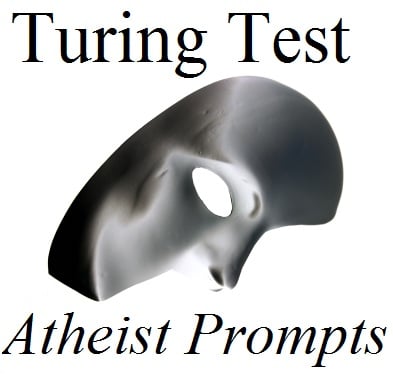This is the ninth entry in the Atheist round of the 2013 Ideological Turing Test. This year, atheists and Christians responded to questions about sex, death, and literature.
Polyamory
There are purely practical reasons why any scheme to recognise and give legal impact to polyamorous relationships should be considered very carefully. There are however no moral arguments against it with a general and secular force. As in my view any religion’s sacrament of marriage is entirely their business and I have no religion, it is irrelevant to me, and I will be discussing only civil marriage in the below.
For example, in the case where four adults are married, two have children together, and then divorce – should the adults in the household who are not biologically parents to those children have any expectation of visitation rights? Presumably so – how though should these be balanced with considerations of stability for the child? If A and B are married, then later add C to their marriage, before A dies, then B and C add D to their marriage, to what extent is this the same marriage in a legal sense? If D is the last survivor of this marital group, should any spousal pension which went to B and C in respect of their marriage to A carry on to D?
Essentially do we treat a case where A and B and C are married as one marriage including three persons, or as three separate marital relationships, each involving two people? To what extent should the law try to recognise the fine shape and structure of a poly blob, and therefore specify it (A and B are the primary couple, with C, D and E as their secondaries; D is part of a primary couple with F while C and E are otherwise single) – and to what extent should it be more of an anything-goes “If you people A-F specify yourselves as a poly marriage, you are”?
Should there be any upper limit on the number of people who can join a poly marriage? Can close relatives both be members of one poly marriage? If yes, what proportion of close relatives as members of a poly marriage should be permitted?
If I could see a clear and consistent way of answering these questions, I would be in favour of poly marriage on those terms. At present I have not seen one. Permitting gay marriage requires only that one strike out “man and woman” write in “two people”, and leave the rest in place (freely consenting, not married to another person, not related, of age, etc). The structure of marriage remains, just who gets to jump through the initial hoop has changed.
Poly marriage is a much more radical change in the terms of marriage, and while I think poly relationships are a morally neutral choice in general (better for some people, worse for others), legal recognition and support for them is a non-trivial demand to make. A demand of “poly equality” is justified, but insufficient, without an idea of what that equality would look like, and I do not expect civil marriage to include poly marriage at least until a somewhat-coherent vision of poly marriage in a legal sense has been developed.
Euthanasia
There is a difference between not administering medical treatment and actively ending life. Administering medical treatment against the wishes of the patient is morally wrong, and refraining from unwanted treatment is obligatory (in the case of an adult of sound mind, whose wishes are known to medical personnel, at least).
Actively ending life is permitted, but not obligatory – if a doctor cannot square euthanising a patient with their own conscience, that is their right, as long as they refer the patient to another doctor who will.
In a broader sense, I value life very highly, so you might expect me to oppose people committing suicide, let alone being helped into suicide. However, I value the life of thinking people who are capable of making their own decisions, and taking the core decision of whether or not their life continues away from people makes a mockery of that. It is more generally recognised that taking away someone’s right to try to continue their own life is a serious moral wrong, only justified under specialised circumstances; but the lesser-recognised corollary is that it is morally wrong to compel someone to continue living when they do not wish to. Life is a right, not a duty.
In the Wheel of Time series, the people of the Borderlands have a saying “Duty is heavier than a mountain; death is lighter than a feather”, recognising that their calling of defending the world against the Blight is of great significance and embracing death is running from their duty. Most of us, as important as we are to our friends and loved ones, do not have a calling of such cosmic significance. Our duty is lighter, but death can still be an escape, and I can’t find it in me to judge people who need that escape. It is a failure of society when someone kills themselves out of desperation or mental illness, but it is no failure when someone staring down the barrel of a terminal condition or a degenerative disease chooses their time and manner of their departure.
More broadly, it is possible to have a moral obligation to kill, in a case where this is the only way to save lives. Much more likely is having moral licence to use force in such a way that people may die, most commonly to preserve your own life or those of others. Certainly there is never a moral obligation to kill to preserve your own life – some people would rather die than kill, and that is their right.
Bonus
I think that speculative fiction, and especially science fiction, is the best genre to explore and express my form of secular humanism. Science fiction at its best is about what it is to be human, and what humans are, and how humans flourish.
And this links back into humanism – whose focus and aim is on humanism and how humans flourish. An author who can write a good science fiction novel will show you a lot of their worldview and what they think makes people tick. Ken McLeod is a good example of this, writing techno-utopian/anarcho-libertarian/Trotskyist novels that give a really good sense of that worldview. David Brin gives a different one, and Ursula LeGuin a different one again. I don’t fully agree with any of them, but to show a worldview I fully agree with in a novel I would have to write it myself.
You can vote on whether you think these answers were written by a Christian or an Atheist here. Comments are open to discuss the substance of the post and for speculation about the true beliefs of the author, so please vote before looking at the comments.











